A while ago I compiled a list of tools to help friends who were writing in English. There are websites, dictionaries, grammar proofreaders. I initially posted these tools as a Twitter thread, then revised the material for my blog.
In my opinion, these tools should help regardless of your EN level — from beginner to advanced, and the context of the writing as well. Be it an email, an article, or your book.
I browse all these tools when writing fictional works and art descriptions in English.
(Self-plug) some of my works:
There’s Fish Market, a Giant/Tiny story featuring a human and a selkie-or-mermaid. My characters Titan and Eden have some chapters as well.
My biggest fanfiction at the moment is ‘Date Pies’, in the Dragon Age universe. There is also a My Time at Portia one-shot.
I use all the resources listed below when writing those, but mostly OneLook’s Reverse Dictionary, Google Docs, and Grammarly.
The tools
Related Words
It uses algorithms to find words related to your search.
It’s great for avoiding repeated words, or finding a more precise term for the expression you have in mind.
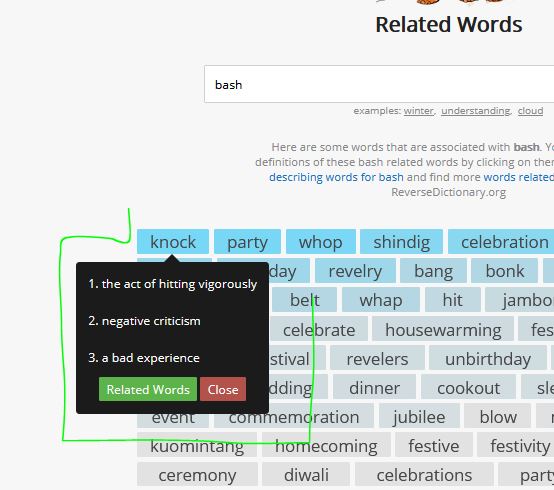
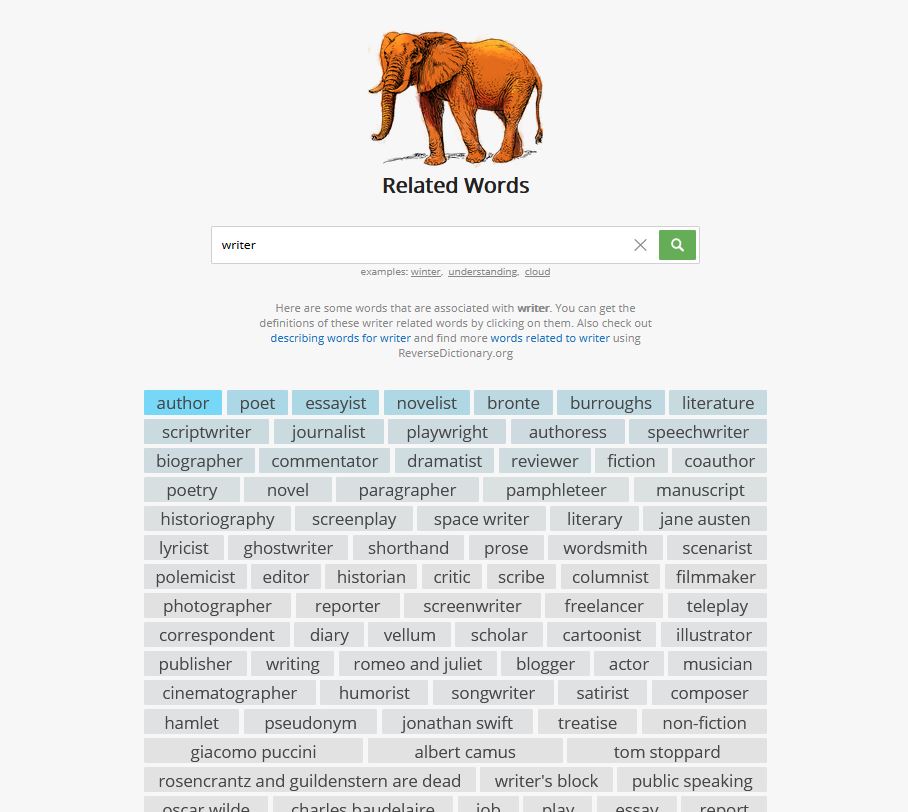
Favorite Dictionaries
I usually stick with these 2 and Google Translator + Google’s synonym search.
Cambridge e Look Way Up
In-depth information about words, including usage examples, colloquial, and formal uses. Example: ‘integrity’
I’ve used LookWayUp plenty of times as well. It lists synonyms.
r/DestructiveReaders
The Destructive Readers subreddit
It’s a critique sharing subreddit. It’s pretty strict and requires commitment giving critique if you want to participate.
I don’t want the commitment, lol, so I browse the sub in search for works that are similar to mine, then read their feedback. It’s extremely helpful already.
And how to use Reddit?
Votes (upvotes e downvotes)
Reddit is based on a system of upvotes and downvotes, which work more or less like the ‘like’ feature found in other networks.
More specifically, they translate to ‘this post contributes to the discussion’ (the upvote) or ‘this post does not contribute to the discussion’ (the downvote).
You can vote like this on comments and posts from others as soon as you open an account, and everything you post is subject to the same system as well.
If you’ve just opened the account, you’ll notice that you won’t be able to reply on some forums (or subreddits).
Your first days on Reddit
My suggestion is to go to your account’s subreddits page, leave the groups that don’t interest you, and search for subreddits that interest you (games, books, gardening, health, art, writing, groups in your language and country, etc).
This guide (in English) has more Reddit tips.
Returning to the list of tools for writing in English:
Google ngram viewer
Shows an “usage timeline” of your query. In other words, it shows how much the word or expression is used in books and publications in a timeline.
Great to know if any expression has fallen out of use, or even if it is written correctly. Example:
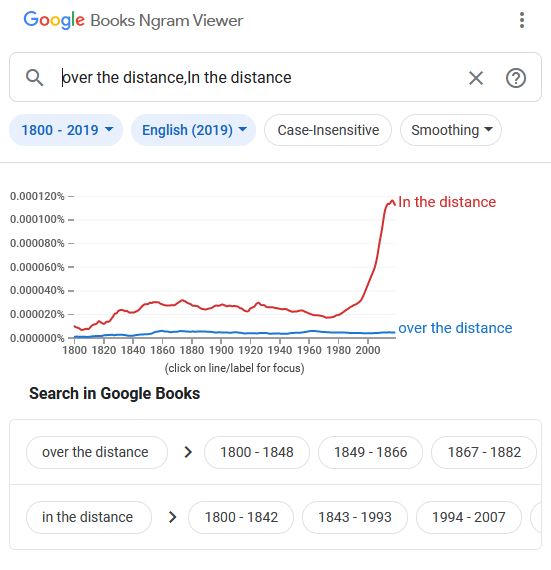
In the end I used “in the distance” because it’s listed as more popular.
You add words or expressions separated by commas, and it shows their frequency of use within 500 years (!!) of publications.
Additional example to the original tweet: You can see if the historical expression that a character of yours uses (example: thou, thee, indeed) was really used in his/her historical period.
Writing dialogue in English
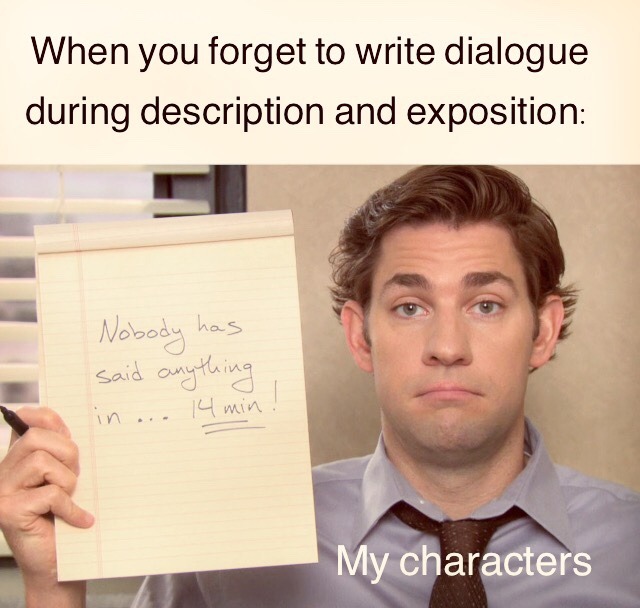
Dialogues written in English do not use dashes (the portuguese-BR standard), but quotation marks.
I like using this article as a guide:
How to Write Dialogue: Formatting, Examples, & Tips
Identifying tropes, archetypes
This is a support tool about creative writing in general: TV Tropes .
I think it’s cool to find the clichés we like, realize which ones we use, and consciously choose what to drop or expand.
An example of a narrative trope: Love triangle, slow burn, enemies to lovers, characters forced to spend the night together, the “badass” woman in the team.
These are narrative conventions, and it’s common for our stories to have some of them — since they’re easy to communicate and identify ourselves with.
It doesn’t have to be negative, but I often see the “cliché” expression being used with a more negative connotation.
Hemingway Editor
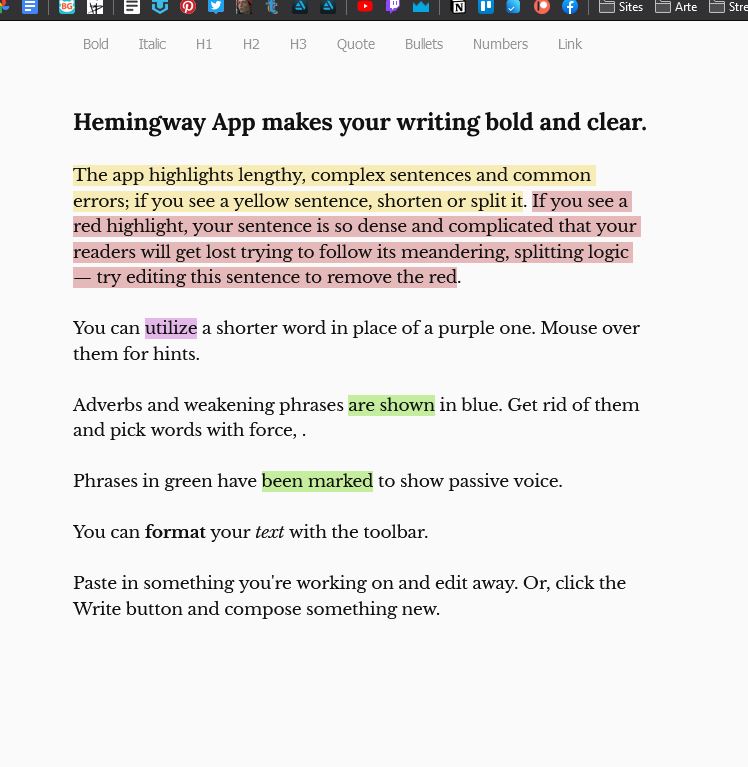
The home page has an example of how it evaluates text, suggesting improvements in readability. You can paste any text onto its page and the evaluation is automatic.
Examples: It suggests simpler words for complex and redundant expressions. It also marks very long paragraphs, or passive voice — which can make the text more confusing.
Atlas of emotions
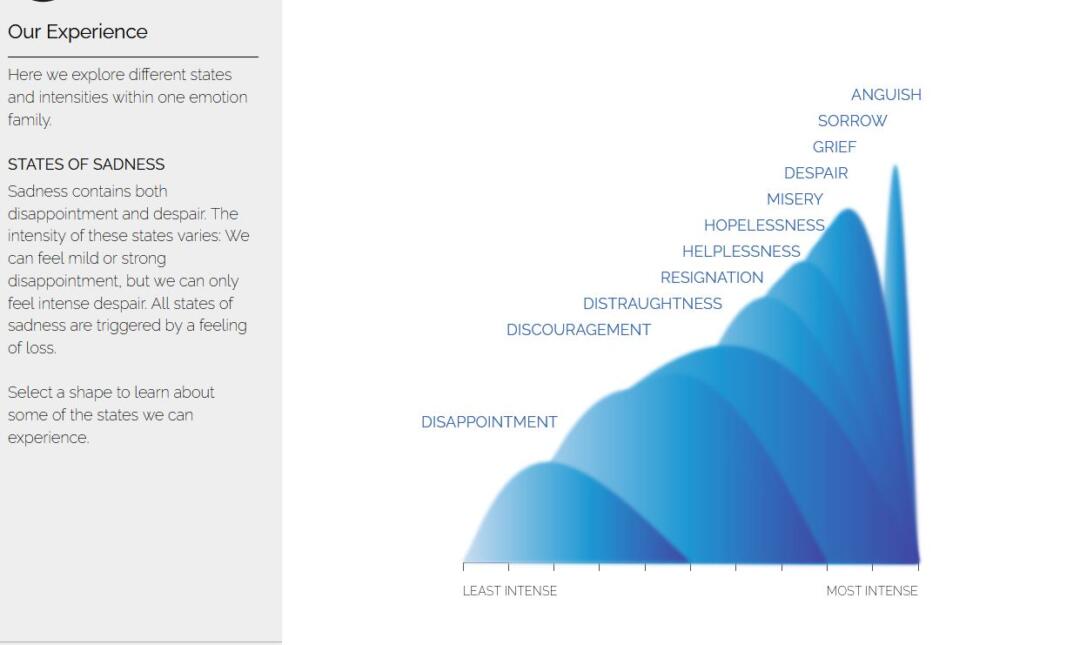
It’s a tool for self-awareness and emotional intelligence, which assembles a chain of events and emotions, physical and mental symptoms, and reactions.
Great for expanding vocabulary and visualizing character emotions
OneLook
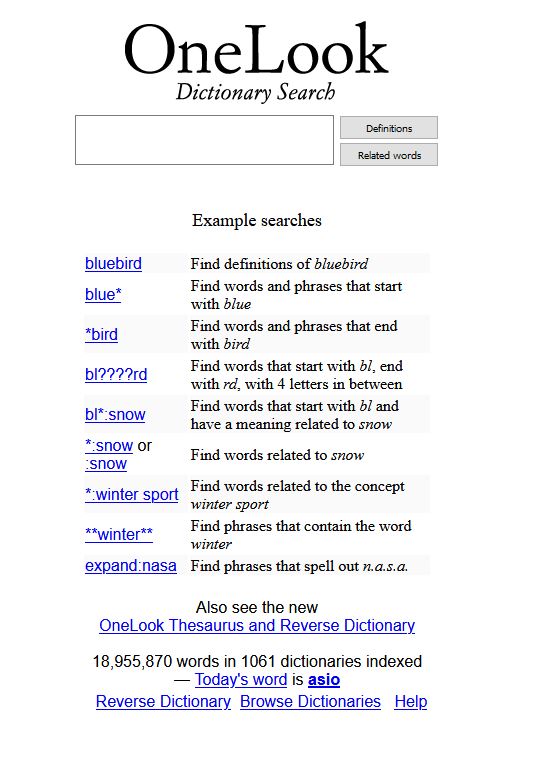
Word search with great filters: https://onelook.com
Golden tip: OneLook Thesaurus — Reverse dictionary
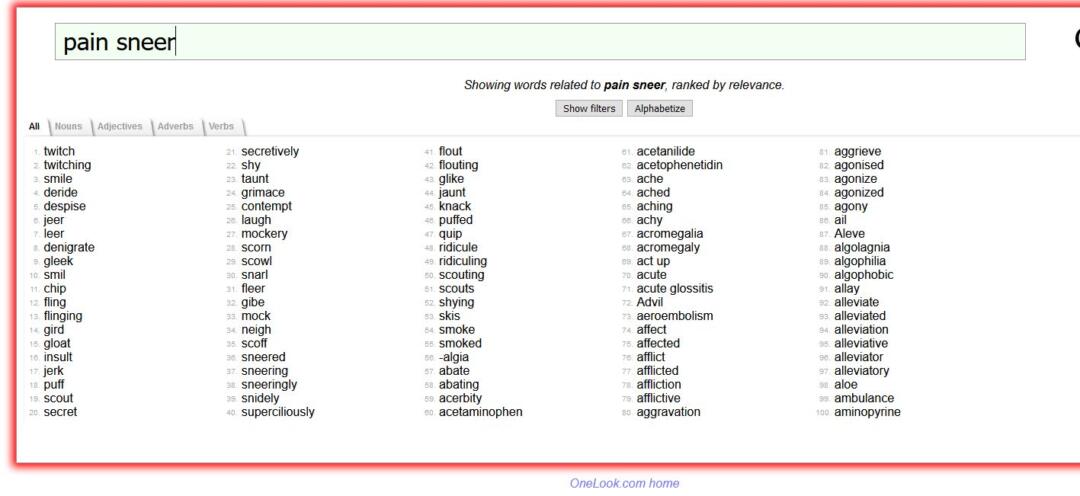
I love this tool. It’s one of the most important items in this list, for me.
OneLook searches for words related to the description you write. I don’t use English in daily life, so my vocabulary isn’t as natural as I want it to be. OneLook often saves my sentences and expressions.
Great for adding variety to long expressions like “small laughs” — which OneLook suggests replacing with chuckle. Imo it sounds more natural, short, and diverse.
https://www.onelook.com/reverse-dictionary
Google Docs tips
The Google Docs Dictionary
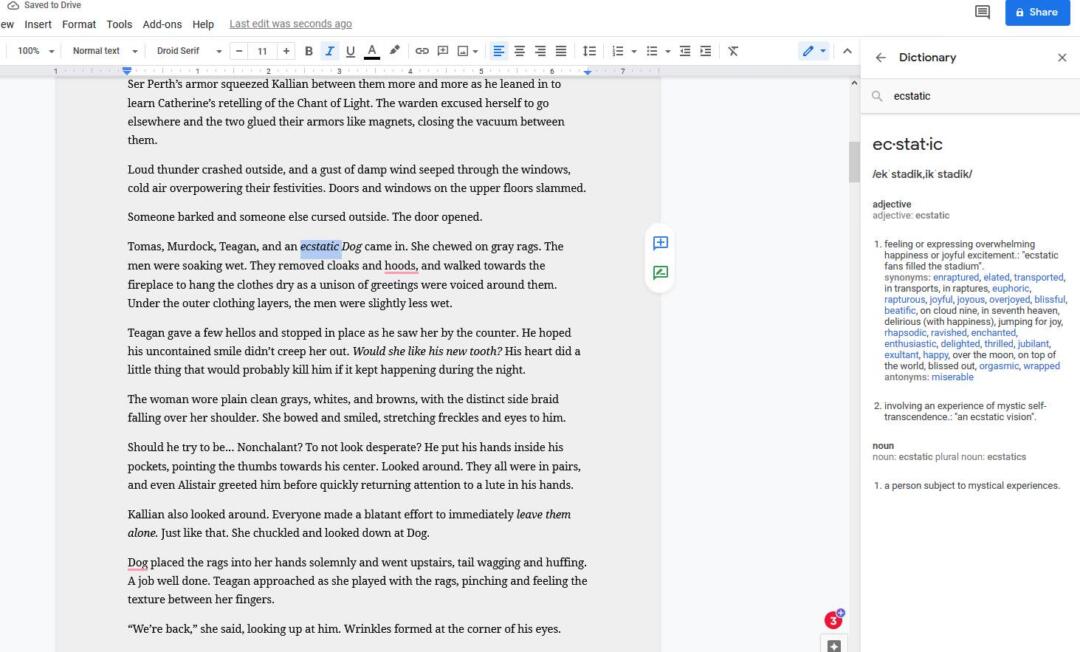
Select the word, right-click and ask for the definition. Or select and ctrl + shift + Y .
The ‘Explore’ function (ctrl+alt+shift+I) also shows some information about the selected word.
Tips from Friends
Grammarly
@madrugatina recommended Grammarly!
It is an extension with grammar, spelling and punctuation suggestions. It works on anything you type into your browser, meaning it’s compatible with Google Docs.

I use it to this day as a Firefox extension when writing long texts in google docs. The tool is great.
I have concerns about privacy (after all, the app needs to have access to everything you write while the extension is active) and the browser slows down a bit if the extension is active during your entire day-to-day usage. So here’s a warning for you to keep those two things in mind.
Note: Madrugatina is on YouTube has years of rich PTBR gaming content. Here are all his networks and channels.
Enjoy, and thank you! If you have more tips, feel free to comment.
My writing and fanfiction posts

Leave a Reply